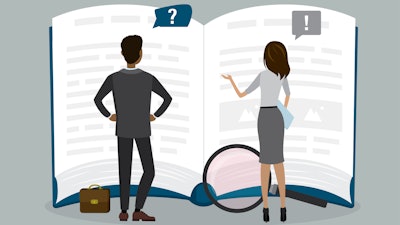
Nothing in the law or otherwise requires an employer to assemble and distribute an employee handbook. Nevertheless, it is considered best practices to have one set of documents that clearly establishes an employer’s policies and expectations and memorializes employees’ agreement to abide by the rules set forth in the handbook. But from the perspective of the National Labor Relations Board (NLRB), your company’s employee handbook may itself violate the law if the rules and policies it contains are found to have a “chilling effect” on employees’ exercise of their employment rights.
And pursuant to a recent NLRB decision, the likelihood that your handbook contains language that won’t pass legal muster – and must be revised accordingly – has increased exponentially.
In its Aug. 2, 2023, decision in Stericycle Inc. (372 NLRB No. 113 (2023)), the board adopted a strict new standard for evaluating the legality of workplace rules, whether contained in an employee handbook or elsewhere. The ruling overturns a more forgiving analysis set forth in two prior NLRB cases – Boeing Co. and LA Specialty Produce Co. – and restores a modified version of the two-factor balancing test it established in Lutheran Heritage Village-Livonia to determine whether a given workplace rule violated Section 7 of the National Labor Relations Act (NLRA).
NLRB Focusing on “Chilling Effect” of Workplace Rules
That statutory section was also at issue in two other recent NLRB cases involving non-competition agreements (discussed in this magazine’s July/August 2023 issue) and non-disclosure provisions in severance agreements (discussed in the May/June 2023 issue). Collectively, these cases signal the board’s focus on challenging any practices or policies that it perceives would chill or coerce employees from exercising their rights under Section 7 of the NLRA, which guarantees employees “the right to self-organization, to form, join or assist labor organizations, to bargain collectively through representatives of their own choosing, and to engage in other concerted activities for the purpose of collective bargaining or other mutual aid or protection.”
“Concerted activity,” as used in Section 7, includes talking with one or more co-workers about wages and benefits or other working conditions, circulating a petition asking for better hours, participating in a concerted refusal to work in unsafe conditions, openly talking about pay and benefits, and joining with co-workers to speak directly to an employer, a government agency, or the media about problems in the workplace.
Old Test for Workplace Rules “Gave Too Much Weight to Employer Interests”
In Stericycle, the board began its analysis by rejecting and pointing out the perceived flaws in the balancing test it had adopted in its Boeing decision, which considered both the “nature and extent of the potential impact” of a workplace rule on an employee’s NLRA rights alongside an employer’s “legitimate justifications associated with the rule.” The board stated that “Boeing gave too little consideration to the chilling effect that work rules can have on workers’ [NLRA] rights” because the standard it established failed “to account for the economic dependency of employees on their employers.” It continued:
Because employees are typically (and understandably) anxious to avoid discharge or discipline, they are reasonably inclined both to construe an ambiguous work rule to prohibit statutorily protected activities and to avoid the risk of violating the rule by engaging in such activity. In turn, Boeing gives too little weight to the burden a work rule could impose on employees’ Section 7 rights. At the same time, Boeing’s purported balancing test gives too much weight to employer interests. Crucially, Boeing also condones overbroad work rules by not requiring the party drafting the work rules – the employer – to narrowly tailor its rules to only promote its legitimate and substantial business interests while avoiding burdening employee rights.
New Two-Step Analysis
In place of Boeing’s balancing test, the board established a two-step analysis to determine whether a workplace rule or policy is unlawful:
Step 1. The first step in the Stericycle test is the NLRB’s general counsel finding that an employee “could reasonably interpret the rule to have a coercive meaning,” leading to a chilling effect on protected or concerted activity. Specifically, the board will assess “the specific wording of the rule, the specific industry, and workplace context in which it is maintained, the specific employer interests it may advance, and the specific statutory rights it may infringe.”
In deciding whether a rule could reasonably be interpreted to have a coercive meaning, the board will analyze it from the “perspective of the economically dependent employee [on their employer] who contemplates engaging in Section 7 activity.” Under this standard, a rule with a “reasonable tendency” to chill employees’ exercise of Section 7 rights will be held presumptively unlawful.
Notably, an employer’s innocuous, noncoercive intent when establishing a rule is irrelevant in this framework. A rule may be presumptively unlawful, “even if a contrary, noncoercive interpretation of the rule is also reasonable.”
Step 2. Once the NLRB proves that a rule is “presumptively unlawful,” an employer can rebut that finding – and the rule will be found lawful – if it can show that:
- the rule advances a legitimate and substantial business interest; and
- the employer could not replace the rule with a more narrowly tailored one.
Distributors Need to Carefully Scrutinize and Adjust Rules
Given the aggressive posture of the current NLRB as to policies and practices that it perceives as affecting and deterring employees from exercising their rights under the NLRA, distributors should dust off their employee handbooks and look at the contents through the NLRB’s highly skeptical lens (as well as ever-evolving labor and employment laws).
Working with experienced employment counsel, distributors should consider whether each employment rule could in any way be seen as chilling employees’ protected activities (as well as any other potential legal defect). As to the NLRA, even rules that appear on their face to be reasonable, neutral, or even beneficial could be deemed unlawful under the board’s employee-friendly approach. Such rules may need to be modified or narrowed in scope. It also means that distributors must be ready to justify their rules and show that they are narrowly tailored to protect their legitimate business interests.
Should anyone have any questions about the Stericycle decision or wish to discuss concerns about the impact of evolving law on your workplace policies and procedures, please contact me at 312-840-7004 or [email protected].
Fred Mendelsohn is a partner at Burke, Warren, MacKay & Serritella PC in Chicago. The information contained in this article is provided for informational purposes only, and should not be construed as legal advice on any subject matter. The author expressly disclaims all liability in respect to actions taken or not taken based on any or all the contents of this article.























